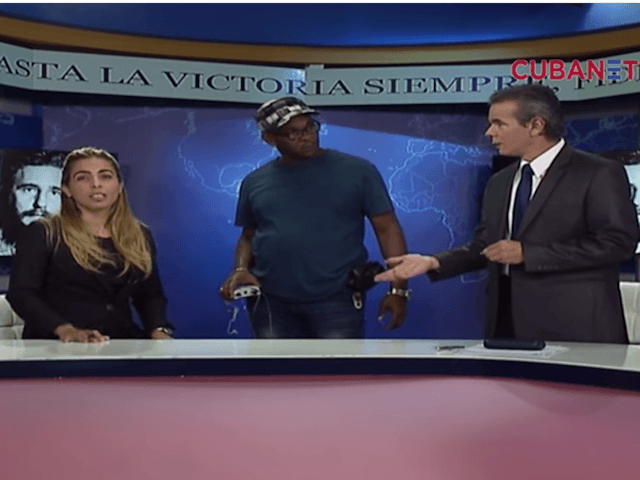Cuban television appears to have mistakenly broadcast a conversation in which a producer warns a news anchor that the communist government has banned the use of “good morning,” “good afternoon” and “good night” during the mandatory nine-day mourning period for dictator Fidel Castro.
The ban appears to have followed an interview with Cuban pro-communist songwriter Silvio Rodríguez, who chastised a Cuban reporter for greeting him with “good morning,” suggesting that no mornings following Fidel Castro’s death are “good.”
“What are we supposed to say to the viewers?” journalist Froilán Arencibia asks his colleague, anchor Mariuska Díaz, settling on “we have to say ‘greetings,'” in a video published by the outlet Cubanet and reproduced at the Miami-based Martí Noticias.
“That ‘good morning’ thing with Silvio is rude,” Arencibia adds, “that’s extreme.”
“What, does it hurt Silvio more than it hurts us?” Díaz protests.
When the signal returns – the video is shut off but not the audio during part of the conversation – Díaz begins her broadcast with “greetings.”
Martí reports that the “Silvio” in question appears to be Silvio Rodríguez, one of the Cuban Revolution’s most celebrated singer-songwriters. In a live broadcast, reporter Cristina Escobar asked Rodríguez to comment on Fidel Castro’s death, greeting him with “good day.” The artist reportedly replied, “the days aren’t very good, really.”
While he did not comment to the reporter, Rodríguez did publish two posts on his blog, Second Date, expressing “condolences to the universe” over the dictator’s death. “With Fidel’s ideas we will construct a socialist, democratic, prosperous, and sustainable society,” he wrote. “His humanist and liberated thinking will guide us. His light is immortal.”
Rodríguez also wrote a shorter note simply titled, “Eternal Glory to Fidel.”
Fidel Castro governed Cuba from 1959 to 2008, establishing labor camps to torture and “disappear” Christians, LGBT Cubans, and other “undesirables,” and frequently ridding himself of more significant threats by using his firings squads. Under Castro, the Cuban secret police has sustained a systematic campaign against pro-democracy, pro-religion, and anti-communist dissidents, a campaign his brother, Raúl Castro, has intensified. According to NGOs working to document such incidents on the island, Cuban police are on track to have executed over 10,000 politically-motivated arrests in 2016.
The Cuban government has imposed a nine-day mandatory mourning period following Castro’s death. “During the National Mourning period, all activities and public spectacles will cease to occur,” state propaganda outlet Granma announced on Friday. “Radio and television will broadcast informative, patriotic, and historic programming.” Listening to music or any public expressions of mirth will result in unspecified law enforcement consequences; selling alcohol is illegal.
In the early morning hours Saturday, Cuban graffiti artist Danilo Maldonado, known by his artistic name “El Sexto,” became the first known arrest for such a public expression of mirth: spray-painting the words “he’s gone” on a wall.
The Cuban government appears to be modeling its treatment of Fidel Castro’s death after his North Korean counterpart, Kim Il-sung, who remains the “Eternal President” of North Korea today despite having died in 1994. Granma has begun to refer to Castro as “El Eterno Comandante” – “The Eternal Commander.”

COMMENTS
Please let us know if you're having issues with commenting.